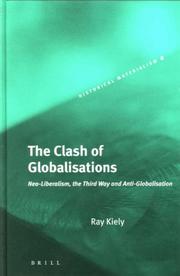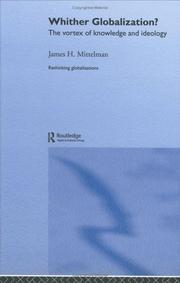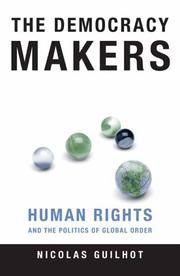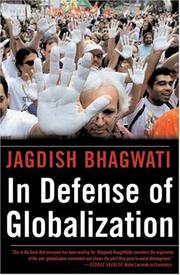| Listing 1 - 10 of 12 | << page >> |
Sort by
|
Book
ISBN: 2082104451 Year: 2005 Publisher: Flammarion,
Abstract | Keywords | Export | Availability | Bookmark
 Loading...
Loading...Choose an application
- Reference Manager
- EndNote
- RefWorks (Direct export to RefWorks)
MOUVEMENT ANTIMONDIALISATION --- ALTERMONDIALISATION --- FRANCE
Book
ISBN: 208080068X 9782080800688 Year: 2003 Volume: 550 Publisher: Paris : Flammarion,
Abstract | Keywords | Export | Availability | Bookmark
 Loading...
Loading...Choose an application
- Reference Manager
- EndNote
- RefWorks (Direct export to RefWorks)

ISBN: 9789004143180 9004143181 9786610867806 9047407202 1280867809 1433704838 9789047407201 9781433704833 9781280867804 6610867801 Year: 2005 Publisher: Leiden Boston Brill
Abstract | Keywords | Export | Availability | Bookmark
 Loading...
Loading...Choose an application
- Reference Manager
- EndNote
- RefWorks (Direct export to RefWorks)
This book provides a powerful critique of the case made for 'globalisation', with particular emphasis placed on neo-liberalism, the third way, and the hegemonic role of the US state. It then examines the rise of 'anti-globalisation' politics and the debate over progressive alternatives to 'actually existing globalisation'.
Globalization. --- Anti-globalization movement. --- Mondialisation --- Antimondialisation --- Alter-globalist movement --- Alternative globalization movement --- Anti-capitalist movement --- Anti-corporate movement --- Anticorporate movement --- Antiglobalization movement --- Fair trade movement --- Global justice movement --- Protest movements --- Globalization --- Global cities --- Globalisation --- Internationalization --- International relations --- Anti-globalization movement

ISBN: 0415341523 0415342066 1134295162 128005896X 0203480201 9780203480205 9786610058969 6610058962 9780415342063 9780415341523 9781134295111 9781134295159 9781134295166 1134295154 Year: 2004 Publisher: London New York, NY Routledge
Abstract | Keywords | Export | Availability | Bookmark
 Loading...
Loading...Choose an application
- Reference Manager
- EndNote
- RefWorks (Direct export to RefWorks)
Globalization is usually said to be about markets and power, and, as a byproduct, culture. Whither Globalization? goes further, arguing that globalization may also be understood as a way of knowing and representing the world.
Globalization --- Globalization. --- International relations. --- Coexistence --- Foreign affairs --- Foreign policy --- Foreign relations --- Global governance --- Interdependence of nations --- International affairs --- Peaceful coexistence --- World order --- National security --- Sovereignty --- World politics --- Global cities --- Globalisation --- Internationalization --- International relations --- Anti-globalization movement --- Mondialisation --- Mouvements antimondialisation

ISBN: 074562989X 0745629881 9780745629896 9780745629889 Year: 2002 Publisher: Cambridge Polity
Abstract | Keywords | Export | Availability | Bookmark
 Loading...
Loading...Choose an application
- Reference Manager
- EndNote
- RefWorks (Direct export to RefWorks)
Globalization --- Socialism --- Globalization. --- Socialism. --- Social change --- International economic relations --- Mondialisation --- Socialisme --- Marxism --- Social democracy --- Socialist movements --- Global cities --- Globalisation --- Internationalization --- Economie --- Politiek --- Welvaart --- Internationalisering --- Collectivism --- Anarchism --- Communism --- Critical theory --- International relations --- Anti-globalization movement --- Maatschappij --- Film --- Aardrijkskunde --- Mouvements antimondialisation

ISBN: 9781848132085 1848132085 9781848132078 1848132077 9781552663578 9781848132092 1848132093 9781848138063 1848138067 1552663574 Year: 2010 Publisher: London Zed Books
Abstract | Keywords | Export | Availability | Bookmark
 Loading...
Loading...Choose an application
- Reference Manager
- EndNote
- RefWorks (Direct export to RefWorks)
"In the early hours of January 1, 1994 a guerrilla army of indigenous Mayan peasants emerged from the highlands and jungle in the far southeast of Mexico and declared "Ya basta!" -- "Enough!" -- to 500 years of colonialism, racism, exploitation, oppression, and genocide. As elites in Canada, the United States, and Mexico celebrated the coming into force of the North American Free Trade Agreement the Zapatista Army of National Liberation (Ejercito Zapatista de Liberacion Nacional, EZLN) declared war against this 500 year old trajectory toward oblivion, one that they said was most recently reincarnated in the form of neoliberal capitalist globalization that NAFTA represented. While the Zapatista uprising would have a profound impact upon the socio-political fabric of Chiapas its effects would be felt far beyond the borders of Mexico. At a moment when state-sponsored socialism had all but vanished from the global political landscape and other familiar elements of the left appeared utterly demoralized and defeated in the face of neoliberal capitalism's global ascendance, the Zapatista uprising would spark an unexpected and powerful new wave of radical socio-political action transnationally. Through an exploration of the Zapatista movement's origins, history, structure, aims, political philosophy and practice, and future directions this book provides a critical, comprehensive, and accessible overview of one of the most important rebel groups in recent history." -- Publisher description.
Socialism --- Anti-globalization movement. --- Socialisme --- Antimondialisation --- Ejército Zapatista de Liberación Nacional (Mexico) --- History. --- Influence. --- 855.5 Gewapende groeperingen --- 882.3 --- Chiapas (Mexico) -- History -- Peasant Uprising, 1994-. --- Ejército Zapatista de Liberación Nacional (Mexico) -- History. --- Indians of Mexico -- Mexico -- Chiapas -- Social conditions -- 20th century. --- Social movements -- Mexico -- Chiapas -- History -- 20th century. --- Sociology & Social History --- Social Sciences --- Social Conditions --- National movements --- Chiapas --- Ejército Zapatista de Liberación Nacional (Mexico) --- 882.3 Midden-Amerika
Book
ISBN: 1442689692 9781442689695 9780802098306 0802098304 9780802096333 0802096336 1442692820 Year: 2008 Publisher: Toronto
Abstract | Keywords | Export | Availability | Bookmark
 Loading...
Loading...Choose an application
- Reference Manager
- EndNote
- RefWorks (Direct export to RefWorks)
Examines how Zapatismo, the political philosophy of the Zapatistas, crossed the regional and national boundaries of the isolated indigenous communities of Chiapas to influence diverse communities of North American activists.
Social movements --- Movements, Social --- Social history --- Social psychology --- History. --- Political activists --- Social justice --- Indigenous peoples --- Anti-globalization movement. --- Mouvements sociaux --- Activistes --- Justice sociale --- Autochtones --- Antimondialisation --- Civil rights. --- Histoire --- Droits --- Ejército Zapatista de Liberación Nacional (Mexico) --- Chiapas (Mexico) --- Chiapas (Mexique) --- History --- Ejército Zapatista de Liberación Nacional (Mexique) --- Mexico. --- Chiapas (provincie) --- Armée zapatiste de libération nationale (Mexico) --- Zapatista National Liberation Army (Mexico) --- EZLN --- Zapatista Army of National Liberation (Mexico) --- Zapatistas
Book
ISBN: 9781845202293 9781845202309 1845202295 1845202309 1000189988 1000183351 1003084656 9786612285950 1474212956 1282285955 1847884512 Year: 2008 Publisher: Oxford ; New York : Berg,
Abstract | Keywords | Export | Availability | Bookmark
 Loading...
Loading...Choose an application
- Reference Manager
- EndNote
- RefWorks (Direct export to RefWorks)
What does 'anticapitalism' really mean for the politics and culture of the twenty-first century?Anticapitalism is an idea which, despite going global, remains rooted in the local, persisting as a loose collection of grassroots movements and actions. Anticapitalism needs to develop a coherent and cohering philosophy, something which cultural theory and the intellectual legacy of the New Left can help to provide, notably through the work of key radical thinkers, such as Ernesto Laclau, Stuart Hall, Antonio Negri, Gilles Deleuze and Judith Butler. Anticapitalism and Culture argues that there is a strong relationship between the radical tradition of cultural studies and the new political movements which try to resist corporate globalization. Indeed, the two need each other: whilst theory can shape and direct the huge diversity of anticapitalist activism, the energy and sheer political engagement of the anticapitalist movement can breathe new life into cultural studies.
Political philosophy. Social philosophy --- Sociology of culture --- Economic order --- Anti-globalization movement. --- Capitalism. --- Culture --- Globalization. --- Liberalism. --- Study and teaching. --- Antimondialisation --- Capitalisme --- Mondialisation --- Libéralisme --- Etude et enseignement --- Anti-globalization movement --- Capitalism --- Globalization --- Liberalism --- #SBIB:316.7C140 --- #SBIB:324H74 --- #SBIB:39A3 --- Liberal egalitarianism --- Liberty --- Political science --- Social sciences --- Global cities --- Globalisation --- Internationalization --- International relations --- Cultural studies --- Market economy --- Economics --- Profit --- Capital --- Alter-globalist movement --- Alternative globalization movement --- Anti-capitalist movement --- Anti-corporate movement --- Anticorporate movement --- Antiglobalization movement --- Fair trade movement --- Global justice movement --- Protest movements --- Study and teaching --- Cultuursociologie: cultuur en globale samenlevingen --- Politieke verandering: sociale bewegingen --- Antropologie: geschiedenis, theorie, wetenschap (incl. grondleggers van de antropologie als wetenschap)

ISBN: 0231131240 9780231131247 0231504195 9780231504195 Year: 2005 Publisher: New York, N.Y. Columbia University Press
Abstract | Keywords | Export | Availability | Bookmark
 Loading...
Loading...Choose an application
- Reference Manager
- EndNote
- RefWorks (Direct export to RefWorks)
Has the international movement for democracy and human rights gone from being a weapon against power to part of the arsenal of power itself? Nicolas Guilhot explores this question in his penetrating look at how the U.S. government, the World Bank, political scientists, NGOs, think tanks, and various international organizations have appropriated the movement for democracy and human rights to export neoliberal policies throughout the world. His work charts the various symbolic, ideological, and political meanings that have developed around human rights and democracy movements. Guilhot suggests that these shifting meanings reflect the transformation of a progressive, emancipatory movement into an industry, dominated by "experts," ensconced in positions of power.Guilhot's story begins in the 1950s when U.S. foreign policy experts promoted human rights and democracy as part of a "democratic international" to fight the spread of communism. Later, the unlikely convergence of anti-Stalinist leftists and the nascent neoconservative movement found a place in the Reagan administration. These "State Department Socialists," as they were known, created policies and organizations that provided financial and technical expertise to democratic movements, but also supported authoritarian, anti-communist regimes, particularly in Latin America.Guilhot also traces the intellectual and social trajectories of key academics, policymakers, and institutions, including Seymour M. Lipset, Jeane Kirkpatrick, the "Chicago Boys," including Milton Friedman, the National Endowment for Democracy, and the Ford Foundation. He examines the ways in which various individuals, or "double agents," were able to occupy pivotal positions at the junction of academe, national, and international institutions, and activist movements. He also pays particular attention to the role of the social sciences in transforming the old anti-Communist crusades into respectable international organizations that promoted progressive and democratic ideals, but did not threaten the strategic and economic goals of Western governments and businesses.Guilhot's purpose is not to disqualify democracy promotion as a conspiratorial activity. Rather he offers new perspectives on the roles of various transnational human rights institutions and the policies they promote. Ultimately, his work proposes a new model for understanding the international politics of legitimate democratic order and the relation between popular resistance to globalization and the "Washington Consensus."
International relations. Foreign policy --- Political systems --- Human rights --- anno 1900-1999 --- Human rights. --- Democracy. --- Globalization. --- Anti-globalization movement. --- World politics --- Droits de l'homme (Droit international) --- Démocratie --- Mondialisation --- Antimondialisation --- Politique mondiale --- Law, Politics & Government --- Human Rights --- #SBIB:327.1H10 --- #SBIB:324H20 --- Internationale betrekkingen: theorieën --- Politologie: theorieën (democratie, comparatieve studieën….) --- Démocratie --- Basic rights --- Civil rights (International law) --- Rights, Human --- Rights of man --- Global cities --- Globalisation --- Internationalization --- Self-government --- Alternative globalization movement --- Anti-capitalist movement --- Anti-corporate movement --- Fair trade movement --- Global justice movement --- Law and legislation --- Human security --- Transitional justice --- Truth commissions --- International relations --- Anti-globalization movement --- Political science --- Equality --- Representative government and representation --- Republics --- Protest movements --- Globalization --- Democracy --- Alter-globalist movement --- Anticorporate movement --- Antiglobalization movement

ISBN: 9780195170252 0195170253 9780195300031 0195300033 0198038070 1280559101 0195303911 0195670515 Year: 2004 Publisher: Oxford Oxford University Press
Abstract | Keywords | Export | Availability | Bookmark
 Loading...
Loading...Choose an application
- Reference Manager
- EndNote
- RefWorks (Direct export to RefWorks)
Drawing on his unparalleled knowledge of international economics, the author explains why the ""gotcha"" examples of the critics are often not as they seem, and that in fact globalization often alleviates many of the problems for which it has been blamed. He describes how globalization helps the cause of women around the world.
International economic relations --- Anti-globalization movement. --- Antimondialisation --- 327.3 --- 327.7 --- -Anti-globalization movement --- Alternative globalization movement --- Anti-capitalist movement --- Anti-corporate movement --- Fair trade movement --- Global justice movement --- Internationale politieke bewegingen --- Internationale activiteiten. Internationale organisaties. Internationale verdragen--(internationale politiek) --- 327.7 Internationale activiteiten. Internationale organisaties. Internationale verdragen--(internationale politiek) --- 327.3 Internationale politieke bewegingen --- Anti-globalization movement --- Globalization --- 339.9 --- 337 --- 382.11 --- AA / International- internationaal --- Protest movements --- 339.9 Buitenlandse economische betrekkingen. Internationale economische betrekkingen --- Buitenlandse economische betrekkingen. Internationale economische betrekkingen --- Economic aspects --- Social aspects --- Theorie van het internationale evenwicht. Economische onafhankelijkheid van een natie. Globalisering. Mondialisering --- #A0412A --- Economic aspects. --- Social aspects. --- Mondialisation --- Aspect économique --- Aspect social --- Alter-globalist movement --- Anticorporate movement --- Antiglobalization movement --- Globalization - Economic aspects --- Globalization - Social aspects --- Acqui 2006 --- ECONOMIE INTERNATIONALE --- ECONOMIE POLITIQUE INTERNATIONALE --- GLOBALISATION --- MONDIALISATION
| Listing 1 - 10 of 12 | << page >> |
Sort by
|

 Search
Search Feedback
Feedback About UniCat
About UniCat  Help
Help News
News